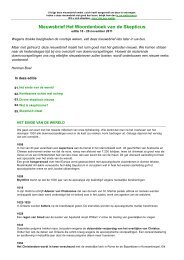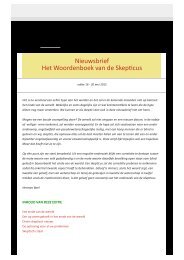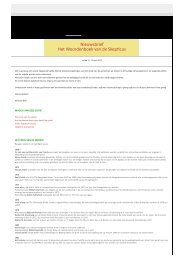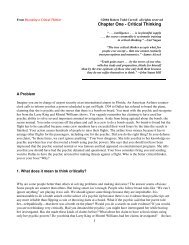A Practical Guide to Critical Thinking - The Skeptic's Dictionary
A Practical Guide to Critical Thinking - The Skeptic's Dictionary
A Practical Guide to Critical Thinking - The Skeptic's Dictionary
You also want an ePaper? Increase the reach of your titles
YUMPU automatically turns print PDFs into web optimized ePapers that Google loves.
Greg R. Haskins<br />
13<br />
Table 2<br />
Hindrances Due To<br />
Use of Language<br />
Hindrance Definition Example <strong>Critical</strong> <strong>Thinking</strong> Tip<br />
Ambiguity<br />
Assuring<br />
Expressions<br />
Doublespeak<br />
Euphemisms<br />
Doublespeak<br />
Jargon<br />
Emotive<br />
Content<br />
False<br />
Implications<br />
Gobbledygook<br />
A word or expression<br />
that can be unders<strong>to</strong>od<br />
in more than one way.<br />
Using expressions that<br />
disarm you from<br />
questioning the validity<br />
of an argument.<br />
<strong>The</strong> use of inoffensive<br />
words or expressions <strong>to</strong><br />
mislead, disarm, or<br />
deceive us about<br />
unpleasant realities.<br />
<strong>The</strong> use of technical<br />
language <strong>to</strong> make the<br />
simple seem complex,<br />
the trivial seem<br />
profound, or the<br />
insignificant seem<br />
important, all done<br />
intentionally <strong>to</strong> impress<br />
others.<br />
Intentionally using words<br />
<strong>to</strong> arouse feelings about<br />
a subject <strong>to</strong> bias others<br />
positively or negatively,<br />
in order <strong>to</strong> gain influence<br />
or power.<br />
Language that is clear<br />
and accurate but<br />
misleading because it<br />
suggests something<br />
false.<br />
<strong>The</strong> use of confusing<br />
non-technical language<br />
<strong>to</strong> mislead or deceive.<br />
From the statement “Lying<br />
expert testified as trial”, is the<br />
expert a liar or is the person an<br />
expert on telling when<br />
someone is lying?<br />
Expressions such as “As<br />
everyone knows…”, and<br />
“Common sense tells us<br />
that…”<br />
Referring <strong>to</strong> a policy of mass<br />
murder as “ethnic cleansing” or<br />
the inadvertent killing of<br />
innocent people as “collateral<br />
damage.”<br />
Referring <strong>to</strong> a family as “a<br />
bounded plurality of roleplaying<br />
individuals” or a<br />
homeless person as a “nongoal<br />
oriented member of<br />
society.”<br />
Naming detergents “Joy” and<br />
“Cheer” (positive), not “Dreary”<br />
and “Tedious” (negative). <strong>The</strong><br />
military using the phrase<br />
“neutralizing the opposition”<br />
(less negative) rather than<br />
“killing” (negative).<br />
<strong>The</strong> dairy industry cleverly<br />
expresses fat content as a<br />
percentage of weight, not of<br />
calories. Thus 2% “low” fat<br />
milk really has 31% fat when<br />
fat is measured as a<br />
percentage of calories.<br />
A company using lengthy and<br />
intimidating language <strong>to</strong> simply<br />
express that if your check<br />
bounces, your receipt is<br />
voided.<br />
If the intended meaning of<br />
an ambiguous word or<br />
expression cannot be<br />
determined, avoid making<br />
judgments.<br />
Disregard assuring<br />
expressions and instead<br />
focus on facts & reasoning<br />
that support arguments.<br />
Look beyond the emotive<br />
(emotional) content and<br />
recognize the cognitive<br />
(factual) content of<br />
euphemistic words and<br />
expressions.<br />
Recognize the cognitive<br />
(factual) content of jargon<br />
words and expressions.<br />
Learn <strong>to</strong> recognize and<br />
distinguish the emotive<br />
(emotional) content of<br />
language. Try <strong>to</strong> focus on<br />
reasoning and the<br />
cognitive (factual) content<br />
of language when<br />
evaluating arguments.<br />
Understand not only the<br />
facts, but also their<br />
relevance and context.<br />
Recognize the cognitive<br />
(factual) content of<br />
gobbledygook words and<br />
expressions.






